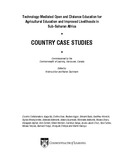| dc.contributor.author | Kironchi, G | |
| dc.contributor.author | Mwang'ombe, AW | |
| dc.date.accessioned | 2013-08-01T08:40:02Z | |
| dc.date.available | 2013-08-01T08:40:02Z | |
| dc.date.issued | 2008 | |
| dc.identifier.citation | Kironchi, R & Mwang'ombe, A. W(2008). Technology-Mediated Open and Distance Education (Tech-MODE) in Agricultural Education and Training in Kenya: Opportunities and Challenges. Technology-Mediated Open and Distance Education for Agricultural Education and Improved Livelihoods in Sub-Saharan Africa: country case studies; Commonwealth of Learning | en |
| dc.identifier.uri | www.wikieducator.org /Tech-MODE_in_SSA | |
| dc.identifier.uri | http://hdl.handle.net/11295/53329 | |
| dc.description | Case study | en |
| dc.description.abstract | Open and distance learning (ODL) in Kenya,
like in many other developing countries,
is characterized by, and offered through,
dual mode institutions. Most of these
programmes are in humanities and social
sciences. Currently, one private university
is offering agricultural training at a
distance using print
medium. A few private
organizations or NGOs carry out short duration informal agricultural capacity
building programmes to farmer groups an
d extension workers using technology-
mediated open and distance education (Tech-MODE).
The Government of Kenya placed emphasis on education and training in agriculture,
because of the important role it plays in
the country’s economy. Although great
potential exists for the use of Tech-MOD
E in agricultural sciences at primary,
secondary, tertiary and informal levels in Kenya, its application still largely remains
untapped. However, with the recent completion of the National ICT Policy (2006),
the Ministry of Education, in consul
tation with stakeholders, developed a
comprehensive National ICT Strategy for
education and training, with a view to
guiding the implementation of informat
ion and communication technology (ICT)
initiatives in the education sector.
This country report highlights the existing
potential in Kenya that the project on
Tech-MODE for agricultural education prop
osed by the Commonwealth of Learning
(COL) could build on. It is suggested that consideration should be given to
strengthening relations with the existing
national, regional and international
institutions and networks or programmes
. Priority areas for training should be identified by all participating stakeholde
rs for support in content development and
institutional capacity building.
This initiative offers opportunities for mu
lti-institutional part
nerships to prepare
training content that would not only provid
e locally relevant and practical knowledge,
but also would be internationally recogniz
ed. Tech-MODE for agricultural education
would offer viable alternatives by lowering
education costs, increasing professional
retention and not taking trainees out of their professional roles and homes for
extended periods. In addition, benefici
aries would contribute to increased and
sustainable agricultural production, develo
pment in the country, poverty reduction
and improved food security | en |
| dc.description.sponsorship | The commonwealth of learning (COL) | en |
| dc.language.iso | en | en |
| dc.subject | Technology-Mediated | en |
| dc.subject | Open and distance education( Tech-mode) | en |
| dc.subject | Agricultural education | en |
| dc.subject | Training | en |
| dc.subject | Kenya | en |
| dc.subject | Oppotunities and challenges | en |
| dc.title | Technology-Mediated Open and Distance Education (Tech-MODE) in Agricultural Education and Training in Kenya: Opportunities and Challenges | en |
| dc.type | Working Paper | en |
| local.publisher | Department of Land Resource Management and Agricultural Technology, University of Nairobi | en |
| local.publisher | Department of Plant Science and Crop Protection, University of Nairobi | en |

